#it is never done in one trip it is an extra BOGO here an extra BOGO there a caselot sale every few months
Explore tagged Tumblr posts
Text
Over 100 Years of Generational Pandemic Trauma with a Side of WW1/Depression/WW2 Trauma and Frugality: 1917-2020
This will be more personal than I usually get on Tumblr, but for some reason, I wanna share it. I wanted to put it in words with a bit of research as a way to process it and maybe get some other stories from other people.
...
So the other day, Mom and I were talking about illness and reactions to the threat of widespread, dangerous illness while watching pandemic coverage on TV. (Yes, we talk about weird social stuff a lot. A lot.) Mom casually said she and her sister were distressed every time they got even a little bit sick and tried to hide it from my grandfather because he seemed to react to illness with anger. Huh, we said, How odd.
“Maybe he was angry at the illness, not at you?” I guessed.
“Hmmmmmmm,” Mom said doubtfully.
So we were taking a break from talking and someone on TV brought up the 1917-1918 flu pandemic.
“Oh, hey, didn’t Great-Grandpa live through that?” I idly asked.
Mom blinked and went utterly still. After a minute of staring blankly, she said, “Oh. Oh.”
“What?”
“He wasn’t angry. He was afraid,” Mom said.
“Who? Oh, Grampa?”
Mom nodded, face in an expression of epiphany.
I started thinking. It turned into diving into family history and history in general.
Okay, so. Let’s back up for some context.
...
2000s back to 1950s back to 1940s back to 1930s back to 1914: Habits from World Wars and the Great Depression
First of all: I know for a fact that my mother, born in the 1950s, was raised on Depression/WW2 Era food frugality. My grandparents lived through both and were old enough to remember them; Grandpa was around twelve on Black Tuesday and Gramma was around two years older. Grandpa and his brother were in the military during WW2.
The things Mom was raised on:
Very simple recipes, all based on salty canned/jarred food that had been cooked to Hell and back. SO MUCH SALT. SO MANY PEAS. Grampa was especially focused on canned food; he likely ate mostly canned food when deployed and on kitchen duty. Treating sugar and salt like gold. Stretching meals that had meat with potatoes and gravy. A backyard pseudo-Victory Garden Gramma and Great-Grandma canned veg from and orange trees that Grampa obsessed over keeping healthy and productive; the garden was dominated by tomatoes to be stewed even into the 1980s and the obsessive care for the orange trees had them massive and healthy when I was a kid in the early 1990s. Butter was for holidays; the rest of the year was margarine (”oleo”). Leftover grease was strained and saved. SO MUCH JELL-O and relish IN SO MANY RECIPES, possibly because it hadn’t been rationed. (You know all those weird old 1960s-1970s recipes with gelatin and odd stuff? Look at when the recipe-makers were kids.) Did you burn your food nearly to charcoal? Eat it. Food was absolutely not to be wasted.
Shoes were to be worn until mending or tape couldn’t hold them together anymore. Weird little broken things were saved in a junk drawer as possibly useful for scrap-- broken rubber bands, screws from something that had broken, old keys, bent nails-- and metal cooking pans were to be used until they started ruining food. Boxes, scrap paper, newspapers, and magazines were to be bundled up and saved.
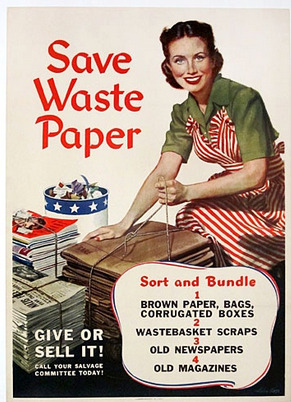
(source)
And so on.
For other rationing information, see the “Make It Do” tag on Sarah Sundin’s blog.
But my grandparents’ frugality goes back another generation. There was no formal rationing in WW1 in the US, but there were massive propaganda campaigns to reduce consumption of certain things. People were encouraged to have “meatless” and “wheatless” days. Weird recipes for “Camouflage Cookery” appeared.
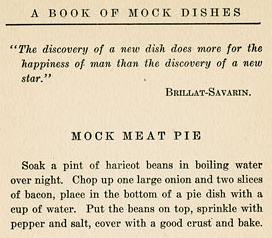
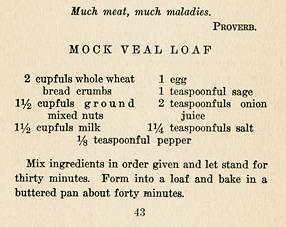
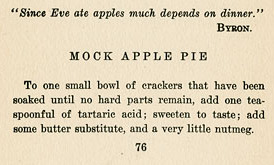
(source)
WW1 “War Gardens” were the predecessors of Victory Gardens. Canning the produce from the gardens was patriotic. And so on.
My grandparents improved bit by bit as Mom grew and Grampa made more money at better jobs and the economy recovered. One of the first things they caved on was having coffee all day every day as some kind of personal victory, but still never with cream or sugar. Mom and I keep suddenly realizing some of their habits were tied to rationing.
Generational drift has kept a lot of those odd little habits. Mom hates vegetables that aren’t salty and cooked to floppiness. Eat freezerburned food because it’s your own damned fault it got freezerburned. Wear shoes until they fall apart and unless they are flip-flops that become 100% unusable, keep the worn out pair until our next pair of shoes wear out “just in case” the new shoes get damaged. Shoelaces are saved when the shoes get trashed. Clothes get ripped beyond repair? Fight the urge to save the cloth for “something.” Recycle things to near-obsession. “Waste not want not,” but for very specific things.
I explain all this to establish that we have already identified patterns in hardship coping mechanisms within our family.
Now we have identified another.
1917-1918 Influenza Pandemic
My great grandparents-- the parents of my maternal grandfather-- were European immigrants who lived in Chicago during WW1 and the pandemic. My other grandparents likely did, too, but I have very little information about them. My GGF’s occupation would be considered non-essential in modern times, but I’m not sure about 1917-1918. I don’t know what he did during that time; though I know there is a Draft Registration Card for him, I have no proof or anecdotal evidence that he served in the military. So he was likely home with his wife and baby. During a time of fear of bringing illness home enhanced by propaganda,

real(?) news,
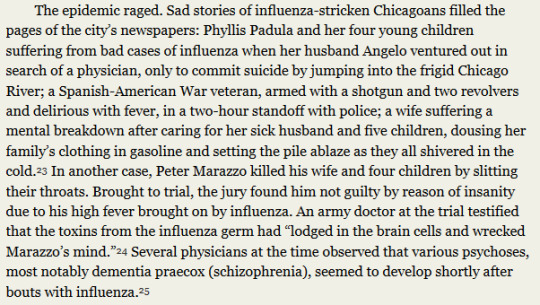
(source)
and gradually escalating sanitary measures imposed by the local government.
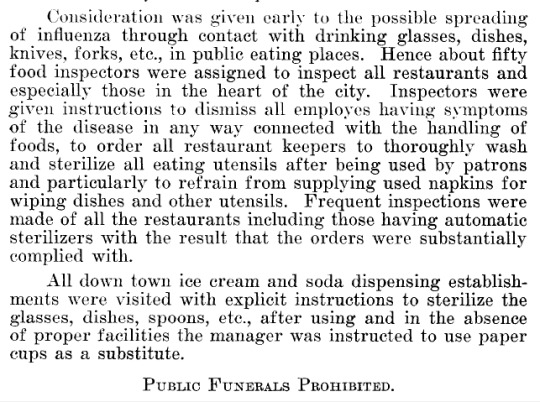
(source)
So. Terror.
Mom and I talked about him. Obsessive about handkerchief use and washing. Strict standards for cleaning. He didn’t live with Mom’s family, so she doesn’t remember much else relevant. And Great Grandmother? She focused on the food and frugality.
But their son, my grandfather? Also obsessive about handkerchief use and washing. So unreasonably obsessed with cleaning that Gramma threw up her hands and said, “Then you do it!” and Grampa, a man in the early 1950s, did it without complaint. Silverware and dishes were never to be shared or used twice and must be washed immediately after use.
He was born during a pandemic and raised by a father who had to keep his family safe during a pandemic. And a world war. And the Great Depression.
How could my great grandfather’s parenting not be affected by all that trauma?
How could my grandfather not be affected by that parenting from trauma?
How could my grandfather’s parenting not be affected by all that trauma, plus trauma from serving in WW2?
How could my mother not be affected by that parenting from trauma?
Mom said she and her sister were distressed every time they got even a little bit sick and tried to hide it from my grandfather because he seemed to react to illness with anger. Huh, we said, How odd.
“Maybe he was angry at the illness, not at you?” I guessed.
“Hmmmmmmm,” Mom said doubtfully.
“Oh, hey, didn’t Great-Grandpa live through that?” I idly asked.
Mom blinked and went utterly still. After a minute of staring blankly, she said, “Oh. Oh.”
“What?”
“He wasn’t angry. He was afraid,” Mom said.
“Who? Oh, Grampa?”
The chain was greatly loosened by my mother, who was a sheltered white girl who literally didn’t know who Martin Luther King Jr. was until everyone started talking about his assassination because my racist grandparents and their social circle controlled her access to media about the Civil Rights Movement so tightly. (The deprogramming of all their underlying racism is a completely different YIKES discussion for another day.) Grampa didn’t serve in Korea, she didn’t have any brothers to get roped into Vietnam, they were very middle class when she was old enough to notice such things, she never really wanted for anything. Just lived a very privileged white girl life.
A charmed life until her mid-30s.
And she still inherited a lot of frugal and cleanliness/sanitation compulsions from my grandparents, which she then passed down to me. Diluted twice over, but very much there. And very useful, now that we are low-income and disabled but still live in a run-down but big house capable of storing extra stuff. If one or both of us has a flare and can’t shop? We just turn to the freezer and pantry and the garage cabinet. Because always having a month’s worth of food is... just how it’s supposed to be, isn’t it?
Buy extra nonperishable food when it’s cheap whenever you can afford it. It’s better to have too much than to have not enough. Mind your hygiene. Wash, wash, wash anything that gets saliva or nasal discharge on it. Wash your hands before, during, and after food prep. Wash your hands in general. Grow your own vegetables and make sure they’re nutritious ones that’ll keep. Some things Are Not To Be Shared. Anything like double-dipping is a crime against humanity. Don’t lick the stirring spoon, or wash it immediately after if you do. Correct people who don’t cover coughs and sneezes and either make them wash their hands if they used them or do not let them touch you. If you get sick or poor or disaster/war breaks supply lines, you’ll be glad to have enough food to live on for a month. Buy extra nonperishable food when it’s cheap whenever you can afford it. It’s better to--
2020 Coronavirus Pandemic: Distilled Generational Habits and Coping Mechanisms
I still have the recipes Gramma carefully saved from the Eagle Brand canned, shelf-stable sweetened condensed milk that was given to her family by local welfare workers in the 1930s.
This is why when panic buying started in early March 2020-- before people started taking the possibility of long-term shutdowns seriously-- one of the first staples I went for was shelf-stable milk. I remember being surprised that there was so much of it on the shelf. Huh.
Fresh potatoes were gone, but the canned and dry/instant potatoes were untouched. Huh. Tons of Gramma’s recipes used “potato flakes.” Don’t they know that fresh potatoes have a much shorter shelf life? Huh.
Fresh tomatoes were picked over, but the canned diced/stewed/paste/sauce were still well-stocked. Huh.
Bread and bread products like tortillas were gone. The flour was untouched. Huh. I didn’t buy any because we already make sure we have a good amount of flour on hand. Same for salt, sugar, yeast, baking soda, and baking powder. Like, we have an in-other-times-(by-which-I-mean-January)-excessive amount of salt, sugar, and baking soda. Prepackaged bread crumbs were untouched; we still had a good amount of panko at home but I got two more boxes because they were BOGO and surely people would soon realize this was good to have for a bit of shelf-stable variety.
Buy extra nonperishable food when it’s cheap whenever you can afford it, Gramma may as well have whispered to me.
I should’ve bought dried split peas to make soup with the leftover ham hock we have in the freezer. They sold out the next week with all the pasta. Which I hadn’t even considered because Mom is diabetic and controls it through diet alone. Pasta is a no-no here.
I was so busy with sorting out *vague gestures* life in general during a pandemic that I delayed going through my seed stock; I didn’t realize some of my staple veggie seeds were so old because I started my garden so late last year that I just bought seedlings. I’m guessing seedlings are gonna sell out. So I was late to go hunting for seeds online, but now they’re in the mail. My usual tomatoes, eggplant, zucchini, cucumbers, and winter squashes, along with things I hadn’t seriously considered before: Green/soup peas. Black-eyed peas. Carrots. Onions. I usually try to grow fun things mixed in with staples but not this year.
Remember to use sunflowers as wind and sun breaks, Grampa may as well have whispered to me. In hot and sunny places, they can make or break a garden. I learned that the hard way when I moved out west. They bring the bees, too.
Okay. I can do this. Thanks.
Conclusion
That meme of the person going “wow I wonder what it would be like to live through a major historical event-- WAIT NOT LIKE THIS NOT LIKE THIS NOOO” has me thinking even more than it usually does. This pandemic has made me acutely aware of how “macro” history’s threads are woven into the “micro” history of my family. It has made me more curious; if we’re shut in for longer, then I may actually get to poke into Mom’s side of the family more. Gaining extra context for things fascinates me-- and could be a great distraction when I’m not able to garden. I’ve already learned a lot.
I really wish I could talk to my grandparents and great grandparents about this. I can already see that I am going to have some habits permanently ingrained in me as compulsions, the same as pandemic and economic disaster did for them.
And I really understand my grandfather’s difficulty controlling anger at an invisible, microscopic enemy and what it could do to your family.
The only difference? I have twenty years of therapy behind me as a tool. I hope that’s enough.
Because yeah, there is anger in my anxiety.
#IN THIS ESSAY I WILL--#OH I ACTUALLY WROTE THE ESSAY#LONGPOST IS LONG#1918 Flu Pandemic#Pandemic#2020 COVID-19 Pandemic#family history#idk maybe oversharing lol#DID I MENTION LONGPOST IS LONG#generational drift of trauma responses#personal things#good thing Mom doesn't have Tumblr or know how to internets in general lol#navel-gazing#THANK YOU FOR COMING TO MY TED TALK#NO1CURR?#ok imma press POST and go hide under a rock#shut up anxiety#JUST CLICK POST COR#I am aware that my ability to buy ahead is privilege#it is never done in one trip it is an extra BOGO here an extra BOGO there a caselot sale every few months
129 notes
·
View notes